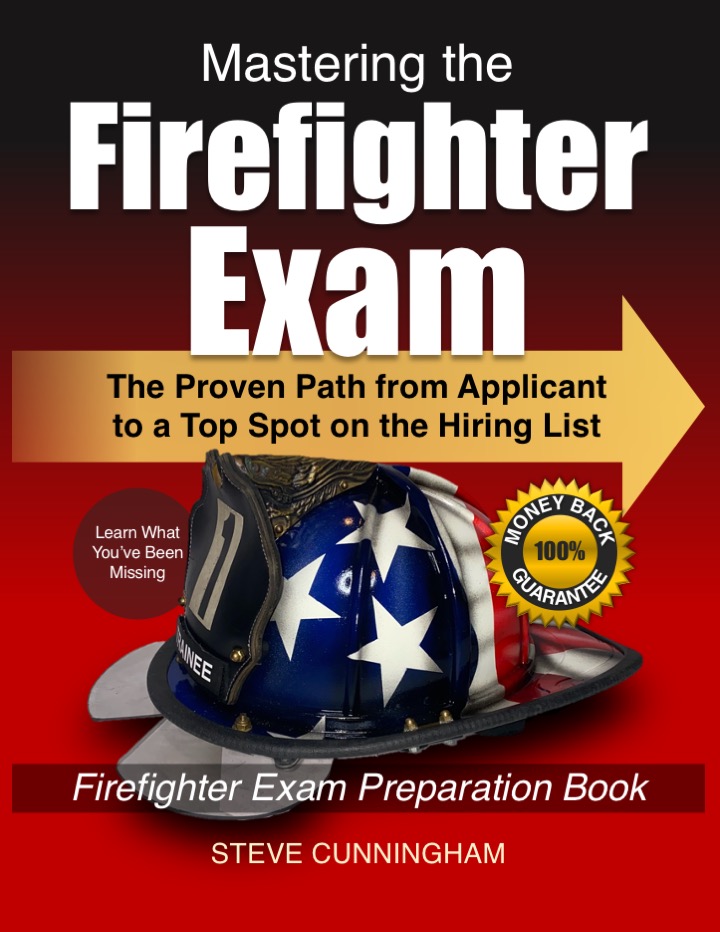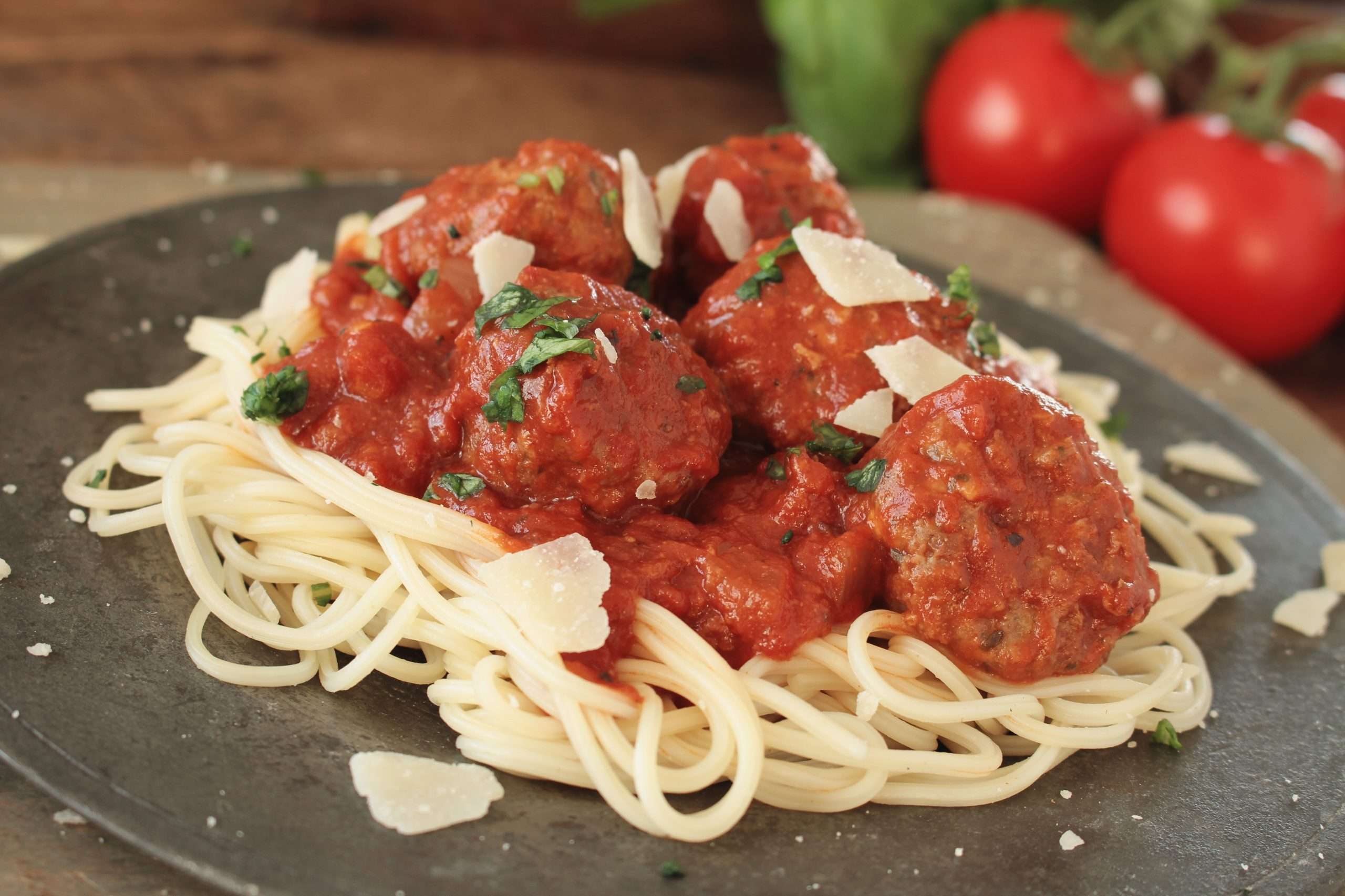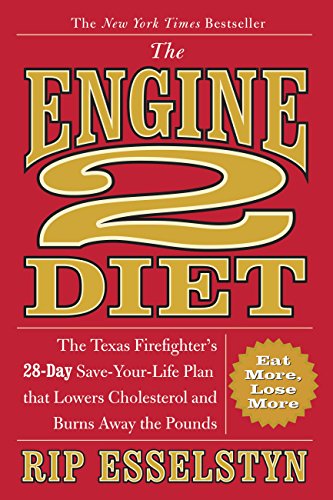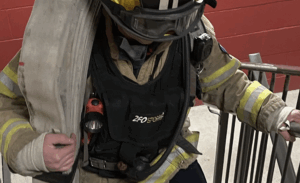Firefighting is a physically demanding and high-stress profession. The rigorous nature of the job requires firefighters to maintain peak physical condition and ensure their bodies are well-fueled to tackle emergencies effectively, which is why I wrote the Firefighter’s Guide to Healthy Eating Habits and Meal Prep.
This article explores the importance of healthy eating habits and meal preparation for firefighters. We’ll discuss the nutritional needs specific to firefighters, provide guidance on building a balanced diet, and delve into the art of meal prep.
Whether you’re a seasoned firefighter or a recruit looking to optimize your health and performance, this guide is designed to help you make informed choices about your nutrition.
Understanding Nutritional Needs for Firefighters
Before diving into the specifics of the firefighter’s guide to healthy eating habits and meal prep, it’s essential to understand the unique nutritional needs of firefighters. This understanding will guide us in making informed dietary choices. Here are the vital nutritional considerations for firefighters:
- The Need for Energy and Endurance: Firefighters often face physically demanding situations requiring high energy levels and endurance to operate effectively.
- The Importance of Muscle Recovery: Firefighting can involve lifting heavy equipment, and effective muscle recovery is crucial to maintaining strength.
- Boosting Immunity and Resilience: Firefighters need a robust immune system to protect against infections and maintain overall resilience.
- Weight Management and Overall Health: Maintaining a healthy weight is vital for firefighters, as excess body weight can hinder performance and lead to various health issues.
Building a Balanced Diet
A balanced diet is the cornerstone of any healthy eating plan. For firefighters, this means consuming the right mix of macronutrients and micronutrients to support physical demands and overall well-being.
Key Macronutrients for Firefighters
- Proteins: Proteins are the building blocks for muscle repair and growth. Foods like lean meats, poultry, fish, eggs, dairy, and plant-based sources such as tofu and legumes provide essential protein.
- Carbohydrates: Carbohydrates are the primary source of energy. Complex carbohydrates like whole grains, fruits, and vegetables should be a firefighter’s primary source of carbs.
- Healthy Fats: Healthy fats, including those found in avocados, nuts, and olive oil, support overall health and provide a dense source of calories.
Micronutrients for Optimal Health
- Vitamins: Vitamins play various roles in maintaining health. Ensure you consume a variety of fruits and vegetables to cover essential vitamins like A, C, and K.
- Minerals: Minerals such as calcium, magnesium, and potassium support muscle function and overall health.
The Role of Fiber in a Firefighter’s Diet
Fiber aids digestion, helps maintain healthy cholesterol levels, and promotes feelings of fullness. Incorporate whole grains, legumes, and fruits with their skins to increase your fiber intake.
Hydration: Water as a Vital Nutrient
Staying well-hydrated is critical for maintaining peak performance. Firefighters must consume adequate water to support bodily functions and regulate body temperature during emergencies.
Eating Smart on Shifts
Firefighters work long shifts, often dealing with emergencies that can lead to erratic meal schedules. Eating smart on shifts can ensure you’re adequately fueled throughout the day.
Making the Most of Meals at the Firehouse
Firehouse meals are essential for firefighters on duty. Optimize these meals for energy and nutrition:
- Breakfast: Fueling Up
Breakfast should be a healthy meal with protein, complex carbohydrates, and healthy fats. Consider oatmeal with fruits and nuts, whole-grain bread, and eggs. - Lunch: Midday Sustenance
Lunch should provide sustained energy. Lean proteins, vegetables, and whole grains are excellent choices. - Dinner: Evening Replenishment
Dinner can be lighter than lunch but should still include a mix of nutrients. Grilled chicken or fish with vegetables and a serving of brown rice is a suitable option.
Snacks for Sustained Energy
Firefighters often need the luxury of traditional meal breaks. Healthy snacks like yogurt, nuts, and fruits are ideal for quick energy boosts between emergencies.
Avoiding Unhealthy Habits on the Job
While it’s crucial to consume adequate calories, avoiding unhealthy habits like stress eating and overindulging in sugary or fatty snacks is equally important. Healthy snacks and portion control are key.
Prepping for Success: The Art of Meal Prep
Meal preparation (meal prep) is a valuable tool for firefighters. It ensures you have nutritious meals readily available, reducing the temptation to make unhealthy choices.
1. Why Meal Prep Matters for Firefighters
The benefits of meal prep go beyond convenience:
- Time Efficiency: Firefighters often work long shifts, leaving limited time for meal preparation. Having prepped meals can save time during hectic days.
- Nutrient Control: Meal prep allows you to choose nutrient-dense foods and control portion sizes. It ensures that each meal is designed to meet your specific dietary needs.
- Cost-Effective: Preparing meals at home can be more cost-effective than eating out or ordering takeout.
2. Building a Meal Prep Plan
A successful meal prep plan involves the following steps:
- Weekly Planning: Dedicate some time each week to plan your meals. Consider your shift schedule and the number of days you’ll be on duty. Create a menu for breakfast, lunch, dinner, and snacks.
- Grocery Shopping: Based on your meal plan, create a shopping list. Stick to the list to avoid purchasing unnecessary items.
- Batch Cooking: Dedicate a few hours to batch cooking on your day off. Prepare meals for the week, portion them, and store them in airtight containers.
- Balanced Nutrients: Ensure each meal includes a source of protein, complex carbohydrates, and vegetables. Prepping components like grilled chicken, quinoa, and steamed broccoli makes mixing and matching for varied meals easy.
- Storage: Invest in high-quality containers that can store food safely. Properly label and date your meals to ensure freshness.
3. Creating Balanced Firefighter Meals
When prepping meals for your shifts, focus on the following tips:
- Lean Proteins: Firefighters need protein for muscle recovery and energy. Incorporate lean proteins like grilled chicken, turkey, fish and plant-based sources like tofu or legumes.
- Complex Carbohydrates: For sustained energy, include whole grains like brown rice, quinoa, and whole wheat pasta.
- Fruits and Vegetables: Make vegetables a centerpiece of your meals. Fruits like apples and berries are convenient snacks.
- Healthy Fats: Avocado, nuts, and olive oil can provide the healthy fats your body needs.
- Hydration: Include water and other hydrating beverages in your meal prep plan. Staying hydrated is crucial for optimal performance.
Sample Meal Plan
Here’s a sample daily meal plan for a firefighter aiming to maintain a balanced and nutritious diet:
Breakfast:
- Scrambled eggs with spinach, bell peppers, and a sprinkle of cheese
- Whole-grain toast
- A serving of mixed berries (blueberries, strawberries, and raspberries)
- Low-fat Greek yogurt
- Glass of water or herbal tea
Morning Snack:
- A small handful of almonds
- Sliced cucumber and carrot sticks with hummus
- Water
Lunch:
- Grilled chicken breast or tofu (for vegetarians) with a side of quinoa
- Steamed broccoli and cauliflower
- Mixed leafy greens salad with cherry tomatoes, cucumbers, and balsamic vinaigrette
- Water or herbal tea
Afternoon Snack:
- Sliced apple with a tablespoon of almond butter
- Celery and bell pepper strips
- Water
Pre-Workout Snack (if exercising at work):
- A banana or an orange
- A small serving of low-fat cottage cheese or a protein shake
- Water
Dinner:
- Baked salmon or a plant-based protein source like lentils or beans
- Steamed asparagus and a side of roasted sweet potatoes
- Whole-grain roll
- A glass of milk, or a dairy-free alternative like almond milk
- Water
Evening Snack (if needed):
- A small serving of mixed nuts or a protein-rich snack
- Water
This sample meal plan emphasizes a balance of lean proteins, whole grains, various colorful vegetables, fruits, and healthy fats. Adapting your meal plan to your specific dietary requirements, preferences, and activity level is essential. For optimal results, consult a registered dietitian or nutritionist to create a personalized meal plan that aligns with your fitness goals and daily schedule.
Supplements for Firefighters
While a balanced diet is the foundation of a firefighter’s nutrition plan, some supplements can help optimize performance, particularly for those looking to build muscle, endurance, and strength. However, supplements should be cautiously approached, and it’s essential to consult a healthcare professional before adding them to your diet. Here are some supplements that firefighters may consider:
- Protein Supplements: Protein is vital for muscle recovery and growth. Protein powders, such as whey or plant-based options like pea or rice protein, can help meet your protein needs. Use them to make post-workout shakes or add to meals.
- Creatine: Creatine is one of the most well-researched supplements for enhancing muscular strength and endurance. It can be especially beneficial if you engage in high-intensity, short-duration activities. Creatine monohydrate is a common and effective form.
- BCAAs (Branched-Chain Amino Acids): BCAAs, including leucine, isoleucine, and valine, can help reduce muscle soreness and fatigue. They are particularly useful during intense workouts or long shifts. BCAA supplements are available in powder or capsule form.
- Pre-Workout Supplements: These supplements typically contain a combination of ingredients like caffeine, beta-alanine, and amino acids to provide an energy boost and improve workout performance. Be cautious with the amount and timing of caffeine, as excessive intake can lead to negative side effects.
- Multivitamins: Firefighters with strict dietary restrictions may benefit from a daily multivitamin to meet their micronutrient needs. A well-rounded diet is the preferred source of vitamins and minerals, but multivitamins can be a safety net.
- Omega-3 Fatty Acids: Omega-3 supplements, usually from fish oil, can help reduce inflammation and support cardiovascular health. Firefighters exposed to extreme situations and stress may consider these for overall well-being.
Remember that supplements complement a balanced diet, not replace it. They should be chosen based on individual needs and goals, and their use should align with safe and effective practices. Proper hydration is essential when taking supplements, especially powder or capsule form.
15K Plus Reviews on Amazon
Homemade Firehouse No-Bake Peanut Butter Chocolate Chip Protein Balls
Ingredients:
- 1 cup old-fashioned rolled oats
- 1/2 cup creamy peanut butter
- 1/3 cup honey or maple syrup
- 1/2 cup ground flaxseed or chia seeds
- 1/2 cup chocolate chips (dark chocolate for a healthier option)
- 1 teaspoon vanilla extract
- A pinch of salt (optional)
- 1/4 cup protein powder (vanilla or chocolate flavored)
- Optional add-ins: chopped nuts, dried fruits, or coconut flakes
Instructions:
- In a large mixing bowl, combine the rolled oats, ground flaxseed (or chia seeds), protein powder, and a pinch of salt if desired.
- Add the peanut butter, honey (or maple syrup), and vanilla extract to the dry ingredients. Mix until everything is well combined.
- Gently fold in the chocolate chips and any optional add-ins you prefer.
- Once thoroughly mixed, place the mixture in the refrigerator for about 20-30 minutes to make it easier to handle.
- After chilling the mixture, roll small portions into bite-sized balls. The size is up to your preference.
- Place the protein balls on a baking sheet or a plate lined with parchment paper.
- Refrigerate the protein balls for 20-30 minutes or until they firm up.
- Once they’ve set, transfer the protein balls to an airtight container and store them in the fridge.
These protein balls make for a convenient and tasty snack for firefighters. They’re packed with protein, healthy fats, and fiber, providing sustained daily energy. Enjoy!
Staying Committed to a Firefighter's Guide to Healthy Eating Habits
Maintaining healthy eating requires dedication and mindfulness, especially in a high-stress profession like firefighting. Here are some strategies to stay committed:
1. Accountability and Support
Share your healthy eating goals with your firefighting colleagues. A support system can help you stay accountable and motivate others to make better food choices.
2. Regular Health Check-Ups
Schedule regular health check-ups to monitor your progress. Consult with a healthcare professional who can offer personalized advice based on your unique needs.
3. Mindful Eating
Practicing mindful eating involves paying full attention to your meals, savoring each bite, and recognizing when you’re satisfied. Avoid eating on the go or during stressful situations.
4. Stress Management
Firefighting can be highly stressful. Finding healthy ways to manage stress, such as through exercise, meditation, or yoga, can prevent emotional eating and maintain healthy habits.
5. Learn from Your Mistakes
Everyone makes dietary mistakes now and then. Instead of feeling guilty, use these moments as learning opportunities. Analyze what led to the choice and think about how to avoid it in the future.
Consult a Professional
Consult a healthcare provider or registered dietitian before incorporating supplements into your nutrition plan. They can assess your specific dietary requirements and make personalized recommendations. They will help you avoid side effects, interactions, or unnecessary expenses.
While supplements can benefit firefighters aiming to enhance their muscle mass, strength, and endurance, they are not a substitute for a well-balanced diet. Focus on nourishing your body with whole, nutrient-dense foods as your primary source of essential nutrients. Supplements should only be used when necessary, guided by professional advice, and never as a replacement for a healthy diet.
This section offers guidance on dietary supplements that firefighters may consider for building muscle, strength, and endurance, emphasizing the importance of consulting healthcare professionals for personalized recommendations. It encourages a whole-food approach to nutrition and clarifies that supplements should not replace a balanced diet but rather enhance specific fitness goals when used appropriately.
Conclusion
As a firefighter, you are a hero dedicated to saving lives and property. Nourishing the hero within you requires careful attention to your nutrition. Healthy eating habits and meal prep are essential; they are your secret weapons for maintaining peak performance and overall well-being.
You can fuel your body efficiently during long shifts by understanding your specific nutritional needs, building a balanced diet, and embracing meal prep. Moreover, making informed dietary choices and staying committed to healthy eating habits ensures you’re always ready to answer the call of duty, no matter the emergency.
Remember, a firefighter’s strength doesn’t just come from the muscles and courage to face flames and the wisdom to nourish their body, the temple of their heroism.
Learn How To Become A Firefighter

Mastering the Firefighter Exam is a complete guide on how to pass the firefighter exam with a top score. It simplifies the complicated hiring practices of big city fire departments and reveals insider information most candidates don’t know about.
If You Would Like To Know How To Get A Head Of Your Competition, This Book Is For You.









